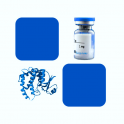
- Remove this product from my favorite's list.
- Add this product to my list of favorites.
Products
Viewed products
Newsletter
 |  |  |  |  |  |

Background
B7-1 and B7-2, together with their receptors CD28 and CTLA4, constitute one of the dominant co-stimulatory pathways that regulate T and Bcell responses. Although both CTLA4 and CD28 can bind to the same ligands, CTLA4 binds to B71 and B72 with a 20 100 fold higher affinity than CD28 and is involved in the downregulation of the immune response. B-lymphocyte activation antigen B7-1 (referred to as B7) also known as cluster of Differentiation 80 (CD80), is a member of cell surface immunoglobulin superfamily and is expressed on activated B cells, activated T cells, macrophages and dendritic cells. It is the ligand for two different proteins on the T cell surface: CD28 (for autoregulation and intercellular association) and CTLA-4 (for attenuation of regulation and cellular disassociation). CD80 works in tandem with CD86 to prime T cells. CD80 plays a role in induction of innate immune responses by activating NF-κB-signaling pathway in macrophages. CD80 is thus regarded as promising therapeutic targets for autoimmune diseases and various carcinomas.
Source
Recombinant Biotinylated Human B7-1, Avitag,His Tag (recommended for biopanning) (B71-H82E9) is expressed from human 293 cells (HEK293). It contains AA Val 35 - Asn 242 (Accession # P33681-1).
Predicted N-terminus: Val 35
Molecular Characterization
This protein carries an Avi tag (Avitag™) at the C-terminus, followed by a polyhistidine tag.
The protein has a calculated MW of 26.5 kDa. The protein migrates as 44-54 kDa under reducing (R) condition (SDS-PAGE) due to glycosylation.
Application
B71-H82E9 works best for experiments that test the binding between B7-1 and candidate antibodies, such as biopanning and other relevant assays.
This product is NOT suitable for neither B7-1 - CTLA-4 or B7-1 - CD28 binding test. For this type of application, we strongly recommend you to choose Biotinylated Human B7-1, Avitag,His Tag (recommended for biopanning) (B71-H82F2) as an alternative.
Biotinylation
Biotinylation of this product is performed using Avitag™ technology. Briefly, the single lysine residue in the Avitag is enzymatically labeled with biotin.
Biotin:Protein Ratio
Passed as determined by the HABA assay / binding ELISA.
Endotoxin
Less than 1.0 EU per μg by the LAL method.
Purity
>95% as determined by SDS-PAGE.
Formulation
Lyophilized from 0.22 μm filtered solution in PBS, pH7.4. Normally trehalose is added as protectant before lyophilization.
Reconstitution
Please see Certificate of Analysis for specific instructions.
For best performance, we strongly recommend you to follow the reconstitution protocol provided in the CoA.
Storage
For long term storage, the product should be stored at lyophilized state at -20°C or lower.
Please avoid repeated freeze-thaw cycles.
This product is stable after storage at:
-20°C to -70°C for 12 months in lyophilized state;
-70°C for 3 months under sterile conditions after reconstitution.
Bioactivity
Please refer to product data sheet.
(1) "Induction of Immunological Antitumor Effects by the Combination of Adenovirus-Mediated Gene Transfer of B7-1 and Anti-Programmed Cell Death-1 Antibody in a Murine Squamous Cell Carcinoma Model"
Hara, Saburi, Uehara et al
Cancers (Basel) (2024) 16 (7)
(2) "[The functional differences of macrophages derived from murine bone marrow and peritoneal cavity]"
Huang, Luo, Lu et al
Xi Bao Yu Fen Zi Mian Yi Xue Za Zhi (2024) 40 (3), 215-221
(3) "[Dual Checkpoint Aptamer Immunotherapy: Unveiling Tailored Cancer Treatment Targeting CTLA-4 and NKG2A"
Ayass, Tripathi, Griko et al
Cancers (Basel) (2024) 16 (5)
Showing 1-3 of 6137 papers.
Follow us